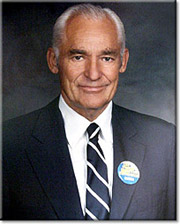|
|
|
|
|
|
| Assignment |
 |
|
|
|
|
|
|
| Assignment |
 |
| Course Home Page |
|
|
|
How did Sam Walton change retail shopping in the United States? |
 |
|
Sam Walton was born in Kingfisher Oklahoma in 1918. From his humble beginnings, he rose and founded the largest retail empire in the world. He attended the University of Missouri at Columbia, graduating in 1940 with a bachelor’s degree in economics. He served as a Captain in the Army Intelligence Corps from 1942 to 1945. He married his wife Helen in 1943, and they had four children over their 49 years together. Sam Walton was always interested in retail. He had early beginnings working at JC Penney as a management trainee before entering the Army. After World War II he decided to open his own business. In 1945 his father-in-law, a successful banker, loaned him $20,000 to open a Ben Franklin variety store. His initial store earned a profit as Sam introduced ideas of cutting costs that are still present in Wal-Mart today. He bought large volumes of goods directly from manufacturers and made his store more accessible to more customers with longer hours and a good central location. He opened his second store, which was also a franchise, named Walton’s 5 & 10 in 1950. The new store, located in Bentonville, Arkansas was a success and was followed by another shortly in Fayetteville, Arkansas. He introduced profit sharing for his employees, and arranged his stores in the modern style of having registers located only at the front, near the exit. Walton continued to expand, until he opened the first Wal-Mart in 1962. Wal-Mart was a success, and continued to grow. Sam Walton initially opened his stores in smaller communities than the other major retailers would touch. He added Sam’s Club to the business in 1983, and in 1985, Sam Walton was named the richest man in America by Forbes magazine. Wal-Mart became the nation’s top retailer in 1990. Sam Walton always said that the customer was right, and all his stores have customer friendly features such as greeters, and a friendly, family oriented environment. Behind the scenes though, Sam Walton was a brilliant and ruthless businessman. He worked very hard to keep his expenses low as possible, and as his business grew, he was able to buy even more merchandise at even lower prices. He believed that the best results in business were found through generosity with employees. Profit sharing has always been a benefit for Wal-Mart employees. By keeping his expenses down, building his stores in areas undesirable to his competition and introducing new concepts in retail practice, Sam Walton permanently changed the way the country shops. Despite his massive wealth, Sam Walton lived a consistent life. He still wore baseball caps, drove an old pick-up truck and enjoyed the outside in the company of his dogs He was always very charismatic, and was very popular from his school days on. He was class president of his high school and college classes, and was active in community activities such as the Rotary Club and chamber of commerce. He knew that he was not as smart as many others, but through hard work and dedication, he was able to push onwards to become the most successful man in retail worldwide. He has established many charitable operations, such as college scholarships. When you are the most successful you can expect to be disliked, and Sam Walton was no exception. He has been criticized and hated for competing with small retailers, and putting them out of business. Scandals about sweatshop conditions for makers of Wal-Mart merchandise haunted Sam, and still plague the management of Wal-Mart. There are also groups who dislike him and Wal-Mart for making the whole country a little more alike, and a little less individual. Then there are the rather drastic groups who feel he is evil, and leads a cult religion! Today Wal-Mart has over 1 million employees in the United States, and is expanding into the international market. Since 1991, over 2000 stores have opened outside the United States, and they employ over 280,000 people. The people who dislike Sam Walton’s style of retail management are a minority, and the popularity of his stores grows constantly. He was known for selling the most merchandise for the lowest prices, and as Wal-Mart expands, the chain is likely to encounter more resistance from people who are afraid of losing their identities to the large and generic super centers. Sam Walton’s legacy lives on in the ever-growing empire of retail, to which he dedicated his life. |
|
|
The life and work of Sam Walton touched many lives in the United Sates, as well as the rest of the world, therefore there are a limitless variety of websites related to him. Here are just a few: The University of Arkansas has a College of Business named for Sam that includes an informative and well-done site. Check out the list of Sam Walton’s 10 rules for success. A&E produced a televised Biography of Sam. The Walmart website includes a summary of Sam’s life, and links to buy a video of the biography. Wal-Mart is expanding globally, and an article from the BBC explains the impact in Europe, as well the history and style of Wal-Mart. Time magazine named Sam Walton to its list of the 100 Most Influential People of the 20th Century. The site includes information from their archives, an audio clip of Sam, and a nice biography. There is also a biographical work produced by a college student at the University of St. Francis. There are a number of sites dedicated to hatred of Sam Walton, inclusing a satyrical wiki-type entry. Still more:
|
|
|
This page is copyright © 2002, C.T. Evans and R.
Sanford.
For information contact cevans@nvcc.edu